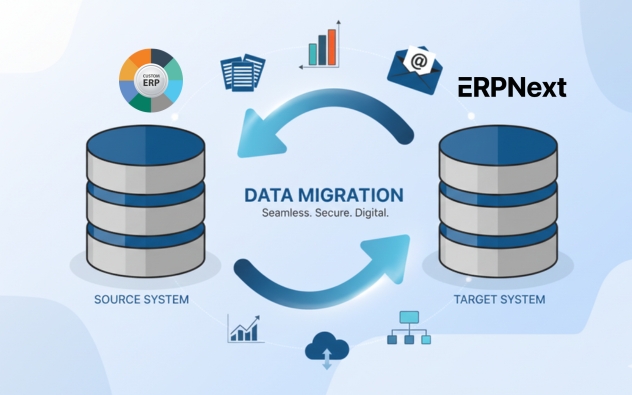Escape the limitations of aging custom-built or legacy ERP systems and embrace ERPNext’s modern, scalable, cloud-ready platform that eliminates technical debt, security vulnerabilities, and unsustainable maintenance costs. Sigzen Technologies specializes in complex legacy system migrations, transforming outdated proprietary platforms, homegrown solutions, and unsupported ERP systems into ERPNext’s flexible open-source architecture while preserving critical business data and operational continuity. Experience ERPNext’s automated workflows, real-time reporting, seamless integrations, and future-proof technology that grows with your business without the constraints of legacy infrastructure.
Break Free from Outdated Systems
Modernize Your Legacy ERP with ERPNext

Why Choose Sigzen Technologies for Custom or Legacy ERP to ERPNext Migration Services?
Step-by-Step Process to Migrating from Custom or Legacy ERP to ERPNext
Legacy System Discovery and Documentation
Conduct extensive discovery analyzing legacy or custom ERP architecture including database structure, custom code, business logic, and undocumented processes. Reverse-engineer system functionality, document workflows, and identify critical dependencies.
Technical Debt Assessment and Modernization Planning
Evaluate technical debt accumulated in legacy system including outdated technology, unsupported platforms, and maintenance challenges. Develop modernization strategy leveraging ERPNext’s contemporary architecture while preserving essential business functionality.
Business Process Reengineering
Document current business processes embedded in legacy system, identify improvement opportunities, and redesign workflows leveraging ERPNext’s modern capabilities. Balance maintaining proven processes with introducing operational enhancements.
Complex Data Assessment and Mapping
Profile legacy data including proprietary formats, non-standard structures, and decades of historical records. Assess data quality comprehensively and create detailed transformation specifications connecting legacy structures to ERPNext’s modern framework.
Custom ETL Development and Data Cleansing
Develop specialized ETL processes handling legacy data formats, implement extensive data cleansing addressing years of accumulated inconsistencies, and prepare datasets ensuring accurate migration to ERPNext.
ERPNext Custom Development and Configuration
Recreate legacy system functionality using Frappe framework, develop custom apps for specialized requirements, and configure ERPNext modules matching business needs. Introduce modern features impossible in legacy environment.
Phased Data Migration with Validation
Execute careful phased migration extracting from legacy databases, transforming using custom scripts, and loading into ERPNext. Maintain legacy system during transition allowing extensive parallel testing and validation.
Integration Modernization
Replace legacy integration methods with modern APIs connecting ERPNext to contemporary systems. Implement automated data exchange eliminating manual processes characteristic of legacy environments.
Knowledge Transfer and Legacy Decommissioning
Conduct comprehensive knowledge transfer documenting institutional knowledge embedded in legacy system. Provide extensive training, support transition intensively, validate complete functionality before legacy system decommissioning.
Get a free no obligation quote now
Ready to unlock the full potential of ERPNext for your business? Contact us today for a no-obligation consultation to learn more about our ERPNext Consulting Services and discover how our expert ERPNext consultants can help you optimize your operations and drive growth with a customized, scalable ERP solution.
A Quick Comparison of Legacy ERP Systems and ERPNext
Feature |
Custom/Legacy ERP Systems |
ERPNext |
| Cost | High maintenance costs; outdated technology with expensive upgrades | Cost-effective with minimal maintenance overhead |
| Customization | Often rigid and difficult to modify; requires specialized developers | Highly customizable with modern low-code framework |
| Community | Limited or no community support; vendor dependency | Active global community with continuous improvements |
| Feature Set | Fragmented modules with poor integration | Unified platform with seamlessly integrated modules |
| Technology | Outdated technology stack with compatibility issues | Modern web-based technology with regular updates |
| Focus | Difficult to adapt to changing business needs | Agile and adaptable to evolving business requirements |
| User Interface | Often outdated and difficult to use | Modern, intuitive interface with minimal learning curve |
| Integration | Limited or no integration capabilities | Open API with extensive integration options |
| Data Migration | Complex and risky with potential data loss | Structured migration process using Data Import Tool with validation and testing |
| Support | Expensive vendor support or no support available | Community support, documentation, and professional services available |

Conclusion
Transitioning from custom or legacy ERP to ERPNext modernizes aging infrastructure while preserving critical business functionality and institutional knowledge. Sigzen Technologies specializes in complex legacy migrations, addressing outdated technology, proprietary structures, and maintenance challenges with proven methodologies. Organizations gain contemporary cloud-enabled platform with mobile accessibility, modern integrations, and sustainable vendor support eliminating legacy system risks. Our migration approach ensures careful knowledge transfer, minimal disruption, and successful transformation delivering operational improvements, reduced technical debt, enhanced security, and foundation for future innovation and growth.
Frequently Asked Questions
Why should we migrate from our legacy/custom ERP to ERPNext?
Organizations migrate from legacy and custom ERP systems to ERPNext to overcome critical limitations threatening business sustainability. Legacy systems suffer from lack of vendor support creating security and compliance risks, mounting technical debt with aging code requiring expensive specialized maintenance, limited scalability preventing business growth and new market opportunities, integration failures blocking connectivity with modern CRM, analytics, and e-commerce platforms essential for competitiveness, talent dependency where system knowledge resides with retiring developers creating operational risks, and data security vulnerabilities from outdated architecture exposing organizations to cyberattacks.
ERPNext provides modern cloud-ready architecture with regular security updates, extensive customization through open-source Frappe framework, seamless integrations with contemporary business tools, active community support ensuring sustainable operations, transparent operations with full code access, and scalable infrastructure supporting growth without legacy constraints. Modernizing to ERPNext eliminates hidden maintenance costs, reduces security exposure, improves operational efficiency, and positions organizations for future success with flexible, sustainable ERP platform.
How long does legacy ERP to ERPNext migration take with Sigzen?
Migration timelines vary significantly based on legacy system complexity, documentation availability, data volume, customization depth, and business size. Well-documented legacy systems with moderate complexity typically require 4-6 months covering assessment, planning, data migration, testing, and go-live. Undocumented custom systems, aging platforms requiring reverse engineering, or complex enterprise implementations may require 6-12 months ensuring thorough analysis and validation.
Notably, successful large-scale migrations have been completed—one case migrated 3.2 million records from multiple legacy systems, another modernized a 20-year Oracle platform for 2000+ users. Sigzen Technologies employs phased approaches allowing incremental module deployment, parallel run strategies maintaining legacy alongside ERPNext during transition, and comprehensive validation reducing risks while enabling faster time-to-value. We provide detailed project timelines during initial assessment based on your specific legacy environment, documentation state, and modernization scope.
Can Sigzen migrate data from undocumented legacy systems?
Yes. Sigzen Technologies specializes in challenging migrations from poorly documented or undocumented legacy systems. We employ systematic reverse engineering analyzing legacy database structures, custom code, business logic, and data relationships to understand system behavior even without formal documentation. Our approach includes direct database analysis examining table structures, relationships, and constraints; code review analyzing legacy programming logic and business rules; stakeholder interviews gathering institutional knowledge from long-time users and administrators; workflow observation documenting actual business processes; and test transaction analysis understanding how legacy systems handle operations.
We create comprehensive documentation during migration process capturing legacy system knowledge, data mappings, transformation rules, and business logic ensuring nothing is lost during modernization. Our extensive experience includes successful migration from 20-year-old Oracle system and consolidation of scattered legacy platforms demonstrating capability with complex undocumented environments.
How does Sigzen handle custom legacy functionality in ERPNext?
Sigzen rebuilds custom legacy functionality leveraging ERPNext’s powerful Frappe framework providing extensive customization capabilities. We analyze legacy custom features including specialized workflows, unique business logic, custom calculations, proprietary algorithms, and industry-specific processes central to operations. ERPNext customization approaches include custom fields for additional data capture matching legacy structures, server scripts implementing backend automation and business logic, client scripts providing interface enhancements and validations, custom DocTypes for specialized legacy entities without standard equivalents, workflow automation replicating approval chains and notification systems, and custom reports matching legacy formats users depend upon.
We prioritize which customizations remain essential versus opportunities to modernize using ERPNext standard features, simplifying operations while maintaining business value. Our development team ensures functional continuity during migration while leveraging ERPNext’s modern architecture for performance, maintainability, and future scalability improvements over legacy constraints.
What are the main challenges in legacy ERP migration and how does Sigzen address them?
Common legacy migration challenges include incomplete or poor-quality data from years of accumulated inconsistencies, undocumented business rules embedded in legacy code, complex custom workflows requiring reverse engineering, integration dependencies with other systems, user resistance to change from familiar legacy interfaces, and business continuity risks during transition. Sigzen addresses these systematically through comprehensive data cleansing removing inconsistencies and validating quality before migration, thorough reverse engineering analyzing legacy systems to understand undocumented functionality, detailed mapping documentation ensuring accurate transformation to ERPNext structures, phased migration approaches reducing risk through controlled incremental steps, parallel run strategies maintaining legacy alongside ERPNext during transition, rigorous User Acceptance Testing validating ERPNext replicates critical business processes, extensive training programs building user confidence and competence, and dedicated support during go-live addressing issues immediately. Our proven methodologies and experienced team successfully navigate legacy complexities delivering smooth transitions.
Will our business operations be disrupted during legacy migration?
Sigzen Technologies minimizes operational disruption through strategic phased migration and parallel run strategies. We implement parallel operations where ERPNext operates alongside legacy system during transition, allowing thorough validation without forcing immediate cutover and providing fallback options if issues arise. Data migrations execute during low-activity periods, weekends, or planned maintenance windows coordinated with your business calendar to minimize impact.
Phased approaches transition modules incrementally—starting with non-critical functions, progressively moving core operations—reducing risks and enabling faster time-to-value. Most Sigzen clients experience zero unplanned operational downtime with our proven planning and execution methodology including detailed cutover plans, comprehensive contingency procedures, and rollback capabilities if critical issues emerge. Dedicated support teams remain available throughout migration and go-live phases addressing user questions and technical issues immediately ensuring business continuity.
What post-migration support does Sigzen provide for legacy modernization?
Sigzen Technologies offers comprehensive post-migration support ensuring successful transition from legacy to ERPNext. We provide dedicated support during critical go-live and initial adoption phases with immediate response to user questions, technical issues, and workflow adjustments as team adapts to modern platform. Our ongoing services include system monitoring tracking performance, stability, and user adoption; troubleshooting resolving technical issues and data quality concerns; optimization identifying workflow improvements and efficiency opportunities; additional customizations addressing evolving business needs; integration enhancements connecting new business tools; and security updates maintaining system security and compliance.
We conduct regular post-implementation reviews gathering user feedback, identifying optimization opportunities, and implementing continuous improvements leveraging ERPNext’s flexibility for enhancements impossible with legacy constraints. Training continues beyond initial deployment, empowering your team to maximize ERPNext’s capabilities including advanced features, reporting, automation, and customization as organization fully embraces modern platform. We remain your long-term modernization partner supporting sustained success and growth.